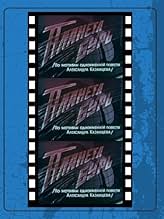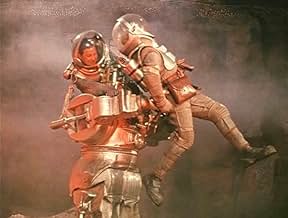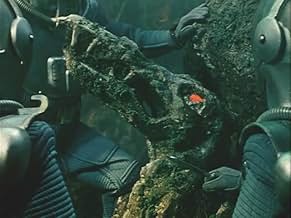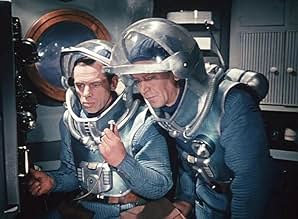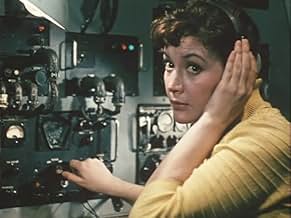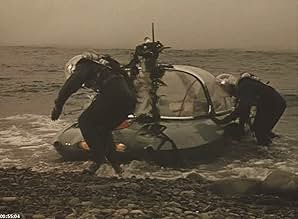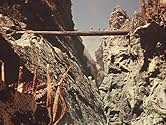IMDb RATING
6.3/10
1.6K
YOUR RATING
Cosmonauts land on the planet Venus. However, they find themselves in danger from the voracious monsters they find on it.Cosmonauts land on the planet Venus. However, they find themselves in danger from the voracious monsters they find on it.Cosmonauts land on the planet Venus. However, they find themselves in danger from the voracious monsters they find on it.
- Director
- Writers
- Stars
- Director
- Writers
- All cast & crew
- Production, box office & more at IMDbPro
Featured reviews
"Planeta Bur" is about cosmonauts who are lost on Venus, attempting to return to the spaceship, and their adventures along the way, which include encounters with prehistoric reptiles, a volcano, and other perils. Like Ptushko's "Sadko", this is a true gem of fantastic film. The use of natural and artificial sets is very effective in creating an atmospheric, alien world; the monsters (an intelligent robot, a carnivorous plant, pestiferous lizard men, a pterodactyl, and some other dinosaurs) are similarly well done. Unlike American films of this kind, there is no emphasis on macho violence or digressions into "steamy" romance scenes; instead the film concentrates on the lavish visuals in an unhurried and dignified pace. My only complaints are that the introduction is too long and slow-moving, and that the subplot involving Masha's agonizing over the fate of her comrades isn't very interesting; but the scenes on Venus, which comprise the bulk of the film, more than make up for these flaws. "Planeta Bur" was drastically edited by Peter Bogdonavitch and released in the States as "Voyage to the Planet of Prehistoric Women"; two versions exist, one with footage of Mamie Van Doren leading a tribe of telepathic Venusian women and worshipping the pterodactyl of the original film, the other without Ms. Van Doren or any of the prehistoric reptile footage.
Not bad, not incredible like "Forbidden Planet" and not as colourful and tragic as "This Island Earth" and it is certainly not "Solaris". But we must give 60s Eastern bloc science fiction its due. None of it is bad. All of it respects the intelligence of the viewers and each manages to create effective atmospheres. The music and background sound were good. The robot and the "supercar" are dated but very good for the time. Naming the robot "John" is a bit of a dig at the West (one could just as easily see Westerners naming a robot Ivan or Igor). The robot is given a Western name while the crew are all self actualized socialist men except for the woman cosmonaut who is given the traditional role of minding the mothership and lamenting over the fate of the men who are off exploring the planet. If that and the song are the social commentary then it could have been much worse.
Pavel Klushantsev, who directed more Russian SF films than he's credited with here, found himself propelled from obscurity into sudden demand by the Soviet authorities when the production of his 1958 SF debut, 'Road to the Stars' coincided with the launch of Sputnik. Although he languished in almost total obscurity in the West, his films were enormously popular in the USSR, and, as a recent documentary noted, many of his cinematic innovations were 'borrowed' 10 years later by Kubrick in '2001'.
Planet of Storms is not a great movie, but compared with most of the SF which the USA was churning up to this time, it's positively stellar. It's weakest points are its sketchy characterisations, and rather poor pacing, but hard SF luminaries like Gernsback and John Campbell would probably have admired its attention to detail, and relative lack of sensationalism. The film actually begins with the disclaimer "Venus may well be entirely different to this" (or somesuch), and what follows is a serious attempt to depict a Venusian expedition - marred perhaps by the odd dinosaur, but surprisingly free of Soviet chest-thumping.
Planet of Storms won't blow your mind, but you'll find yourself being charmed by the ingenious photography, sets, creatures, etc. There's also a straight out hilarious scene where the Robot gets rained on, and goes off his head. While his two human companions are lying on the ground, dangerously ill from fever, he's babbling on about building a concrete highway to reach the other half of the expedition, who are are about 20 miles away. Contacting him via radio, they are somewhat alarmed to hear him tell them "According to quotes from the Smith corporation, the cost of building a highway to the Sirius is 37 million dollars". I don't know if this was a dig at capitalism, but it cracked me up anyway.
Now - some bloke wanted a translation of the lyrics to the song. These are courtesy of SBS TV Australia (translated by Elena Mikrailik and Brendan Doyle)
(first version)
Planet of Storms, we thank you for your lessons / We enjoyed our stay, but now we must be gone / Our ship awaits; our way is clear and straight / Our hearts are calling, "home, home home" / Yes, home, dear Comrades //
It's time to calculate the points of bearing / It's time to place our courage at the helm / She waits for us, the planet of our birth / Our dear home; our one and only Earth / Yes, Earth / Earth, dear Comrades //
(end of movie version)
Planet of Storms, we'll see you soon, don't worry / And in your harbour, our ships will gladly berth / For not in vain are we the sons of Earth / For not in vain are we the sons of Earth / Earth, dear Comrades
Planet of Storms is not a great movie, but compared with most of the SF which the USA was churning up to this time, it's positively stellar. It's weakest points are its sketchy characterisations, and rather poor pacing, but hard SF luminaries like Gernsback and John Campbell would probably have admired its attention to detail, and relative lack of sensationalism. The film actually begins with the disclaimer "Venus may well be entirely different to this" (or somesuch), and what follows is a serious attempt to depict a Venusian expedition - marred perhaps by the odd dinosaur, but surprisingly free of Soviet chest-thumping.
Planet of Storms won't blow your mind, but you'll find yourself being charmed by the ingenious photography, sets, creatures, etc. There's also a straight out hilarious scene where the Robot gets rained on, and goes off his head. While his two human companions are lying on the ground, dangerously ill from fever, he's babbling on about building a concrete highway to reach the other half of the expedition, who are are about 20 miles away. Contacting him via radio, they are somewhat alarmed to hear him tell them "According to quotes from the Smith corporation, the cost of building a highway to the Sirius is 37 million dollars". I don't know if this was a dig at capitalism, but it cracked me up anyway.
Now - some bloke wanted a translation of the lyrics to the song. These are courtesy of SBS TV Australia (translated by Elena Mikrailik and Brendan Doyle)
(first version)
Planet of Storms, we thank you for your lessons / We enjoyed our stay, but now we must be gone / Our ship awaits; our way is clear and straight / Our hearts are calling, "home, home home" / Yes, home, dear Comrades //
It's time to calculate the points of bearing / It's time to place our courage at the helm / She waits for us, the planet of our birth / Our dear home; our one and only Earth / Yes, Earth / Earth, dear Comrades //
(end of movie version)
Planet of Storms, we'll see you soon, don't worry / And in your harbour, our ships will gladly berth / For not in vain are we the sons of Earth / For not in vain are we the sons of Earth / Earth, dear Comrades
It doesn't compare with modern day films at all, but then one shouldn't try to, should one? Gee they all (and probably "we too") took themselves so seriously those days!!
I'm confused by one previous commentator who said the film was in black and white. Maybe her TV was, but the film as I saw it last night certainly was in colour (well, 1960s colour, anyway).
One quote from the film certainly is worth commenting. That's where they are speculating that there may have been creatures who crashed their spaceship a long time ago and then turned feral. The character comments that they would have had "no culture". Well, that's the Eastern European way, isn't it? Culture is so important; but what they can't seem to perceive, so useless. As author Stephen Coonts said of the Russians: "They can all write poetry but not a single one of them can change a light bulb" (well something like that, anyway).
But putting that to one side, yes a most interesting and well-made film of its time. The singing absolutely blew me away. Not the quality of the singing, I mean the fact that they had singing at all in what otherwise seems to me such a "serious" movie!
I'm confused by one previous commentator who said the film was in black and white. Maybe her TV was, but the film as I saw it last night certainly was in colour (well, 1960s colour, anyway).
One quote from the film certainly is worth commenting. That's where they are speculating that there may have been creatures who crashed their spaceship a long time ago and then turned feral. The character comments that they would have had "no culture". Well, that's the Eastern European way, isn't it? Culture is so important; but what they can't seem to perceive, so useless. As author Stephen Coonts said of the Russians: "They can all write poetry but not a single one of them can change a light bulb" (well something like that, anyway).
But putting that to one side, yes a most interesting and well-made film of its time. The singing absolutely blew me away. Not the quality of the singing, I mean the fact that they had singing at all in what otherwise seems to me such a "serious" movie!
I'm of the opinion that film is powerful, powerful enough that large segments of our imagination is guided by cinematic relationships. That even the nature of reasoning is affected, even as deeply as how we reinvent practical logic. There are lots of examples to show and arguments to be made -- they are in a collection I am incubating.
Science fiction is a special case, at once more obvious. Not all as subtle as what I study. But surely it had as profound an effect on daily lives.
To understand this film, you need to know some history. Alas, many readers will not appreciate the cold war that was the overriding impetus for the two largest political entities from the 50s through the 80s.
Some dates for you. In 56, the US saw "Forbidden Planet," with a superintelligent robot, space travel and mind augmentation. It was based on Shakespeare's most interesting play and is still among the best scifi films.
In 57, Russia launched a satellite and declared that they "owned" space (and would put nuclear bombs over the US ready to "drop"). Also, that soon, they would have men in space.
In 58 one of the most successful Russian filmmakers (Klushantsev) made a film about "cosmonauts" and space travel that was enormously successful with the Russian public (and their captive peoples). That film was the beginning of a deeper than usual partnership between Klushantsev and the propaganda arm of the Kremlin.
In 1960, an unknown in East Germany made a film (Road to the Stars) about cosmonauts on Venus. It was a runaway hit. In the following year, Kennedy made his famous pledge to put an American on the moon by the end of the decade.
The Soviet moon program had some catastrophic disasters, in large part resulting from lies told to the old Stalin regime by Soviet scientists working on ballistic missiles supposedly (but not really) capable of destroying the US. Khrushchev had these scientists destroyed or imprisoned. That meant no moon program.
But the people already were convinced that Venus was the prize, so the space propagandists seized on this and retooled their manned program as a race to Venus, forget the moon. As a consequence, Klushantsev was given a (for the times and conditions) vast budget and told to make a film of the heroic Soviet nation exploring Venus. This he did in the film you'll see here if you can find it.
Our intrepid crew is asked to make the Soviet people proud, a promise they come back to a few times. There's a robot, clearly stolen from "Forbidden Planet."
The thing revolves around there being life on Venus. Just as they take off, they find proof that the life consisted of humans. Afterthey leave, we see a beautiful woman appear. Then, as the spacecraft flies home, we have a few minutes of a Soviet heroes song in that militant, deliberately fake spontaneous joyous tone of the times.
The effects developed by this team would be used in strange circumstances for the next 8 years. This crew filmed fake footage of real spaceflights. The Kremlin was never so bold as to fake a success when everyone knew the missions ended in fiery death. But they did decorate their successes with these true-fake movies. The most famous was the 65 spacewalk of Leonov, wonderfully believable until you wonder who is holding the camera. Oddly, the propagandists assumed that the camera eye was such a magical omnipresence that no one would ask.
Anyway, this film was somehow procured by the infamous Roger Corman. He shortened it and dubbed in English. He substituted the blank female (who says in an orbital craft) with an even more blank female. One wonders why; Faith Domergue had been hot 15 years earlier but here is wallpaper. And he adds an earthside leader who radios a few times, played by the already embarrassing Basil Rathbone. Something interesting could be said about his Sherlock Holmes here.
Kubrick's 1968 2001, used many conventions from this shop, even when they went against the science of the thing. And ever since, on through "Star Wars," we have that single vision of what space SHOULD look like.
Ted's Evaluation -- 2 of 3: Has some interesting elements.
Science fiction is a special case, at once more obvious. Not all as subtle as what I study. But surely it had as profound an effect on daily lives.
To understand this film, you need to know some history. Alas, many readers will not appreciate the cold war that was the overriding impetus for the two largest political entities from the 50s through the 80s.
Some dates for you. In 56, the US saw "Forbidden Planet," with a superintelligent robot, space travel and mind augmentation. It was based on Shakespeare's most interesting play and is still among the best scifi films.
In 57, Russia launched a satellite and declared that they "owned" space (and would put nuclear bombs over the US ready to "drop"). Also, that soon, they would have men in space.
In 58 one of the most successful Russian filmmakers (Klushantsev) made a film about "cosmonauts" and space travel that was enormously successful with the Russian public (and their captive peoples). That film was the beginning of a deeper than usual partnership between Klushantsev and the propaganda arm of the Kremlin.
In 1960, an unknown in East Germany made a film (Road to the Stars) about cosmonauts on Venus. It was a runaway hit. In the following year, Kennedy made his famous pledge to put an American on the moon by the end of the decade.
The Soviet moon program had some catastrophic disasters, in large part resulting from lies told to the old Stalin regime by Soviet scientists working on ballistic missiles supposedly (but not really) capable of destroying the US. Khrushchev had these scientists destroyed or imprisoned. That meant no moon program.
But the people already were convinced that Venus was the prize, so the space propagandists seized on this and retooled their manned program as a race to Venus, forget the moon. As a consequence, Klushantsev was given a (for the times and conditions) vast budget and told to make a film of the heroic Soviet nation exploring Venus. This he did in the film you'll see here if you can find it.
Our intrepid crew is asked to make the Soviet people proud, a promise they come back to a few times. There's a robot, clearly stolen from "Forbidden Planet."
The thing revolves around there being life on Venus. Just as they take off, they find proof that the life consisted of humans. Afterthey leave, we see a beautiful woman appear. Then, as the spacecraft flies home, we have a few minutes of a Soviet heroes song in that militant, deliberately fake spontaneous joyous tone of the times.
The effects developed by this team would be used in strange circumstances for the next 8 years. This crew filmed fake footage of real spaceflights. The Kremlin was never so bold as to fake a success when everyone knew the missions ended in fiery death. But they did decorate their successes with these true-fake movies. The most famous was the 65 spacewalk of Leonov, wonderfully believable until you wonder who is holding the camera. Oddly, the propagandists assumed that the camera eye was such a magical omnipresence that no one would ask.
Anyway, this film was somehow procured by the infamous Roger Corman. He shortened it and dubbed in English. He substituted the blank female (who says in an orbital craft) with an even more blank female. One wonders why; Faith Domergue had been hot 15 years earlier but here is wallpaper. And he adds an earthside leader who radios a few times, played by the already embarrassing Basil Rathbone. Something interesting could be said about his Sherlock Holmes here.
Kubrick's 1968 2001, used many conventions from this shop, even when they went against the science of the thing. And ever since, on through "Star Wars," we have that single vision of what space SHOULD look like.
Ted's Evaluation -- 2 of 3: Has some interesting elements.
Did you know
- TriviaThis movie is later edited and dubbed as "Voyage to the Prehistoric Planet", released in the US in 1965. This movie (and the Russian inserts) were in turn used to create "Voyage to the Planet of Prehistoric Women" (1968)
- Alternate versionsFor the U.S. version, titled Voyage to a Prehistoric Planet (1965), all footage of Kyunna Ignatova has been removed and replaced with footage of American actress Faith Domergue playing the same part.
- ConnectionsEdited into Voyage sur la planète préhistorique (1965)
- How long is Planeta bur?Powered by Alexa
Details
- Runtime1 hour 18 minutes
- Sound mix
- Aspect ratio
- 1.37 : 1
Contribute to this page
Suggest an edit or add missing content

Top Gap
By what name was La planète des tempêtes (1962) officially released in Canada in English?
Answer
